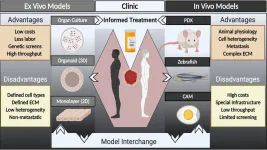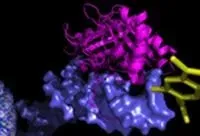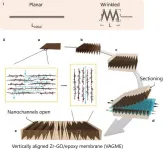(Press-News.org) Medicated drops may help close small macular holes over a two- to eight-week period, allowing some people to avoid surgery to fix the vision problem, a new study suggests.
The findings, based on a retrospective multicenter case series published Dec. 15, 2020, in Ophthalmology Retina, could lead to a better understanding of which patients may benefit from the treatment, as well as the timeline of the treatment's effectiveness.
"For certain patients, medicated drops may heal their macular hole by decreasing inflammation and increasing fluid absorption in the retina," said ophthalmologist and retinal surgeon Dimitra Skondra, MD, PhD, senior author of the study. Skondra is an associate professor of ophthalmology and visual science and director of the J. Terry Ernest Ocular Imaging Center at the University of Chicago Medicine.
Macular holes are age-related and usually affect people over 60 years old. An area located in the retina on the inside back of the eyeball, the macula allows us to have sharp, central vision. Depending on the size and location of the break in a person's macula, the holes can cause distorted, blurred or a dark patch in central vision.
Between 4% and 11.5% of macular holes end up closing on their own, but for those that do not, the traditional treatment is a vitrectomy. This surgical procedure involves removing most of the gel-like fluid that fills the space between the retina and lens, repairing the macula at the back of the eye, then adding a gas bubble to the eye cavity. Much like a temporary bandage, the gas bubble helps the edges of the hole come together and eventually close.
Unfortunately, patients must remain face down for several days and nights after the procedure while the gas bubble floats to the back of their eye. Even then, a small percentage of holes do not close; others may reopen later or the patient may develop complications, such as a cataract, retinal detachment, scar tissue or peripheral vision loss.
All 14 of the study's patients had some swelling around the hole, which is common, and half had previously undergone retinal surgery.
As an alternative to surgery, the researchers prescribed a daily three-drug regimen -- medications that are FDA-approved and routinely used for other eye conditions -- consisting of prednisolone or difluprenate, ketorolac or bromfenac and brinzolamide or dorzolamide. The goal was to dehydrate patients' retinas, decrease the swelling and allow the edges of the macular holes to creep back together.
Using this topical medicated treatment, twelve of the fourteen patients had holes that closed within two to eight weeks - two to four times faster than spontaneous closure rates of macular holes. The two patients that did not have closure within this time period had multiple missed follow-up appointments. The treatment was most effective for patients whose macular holes were less than 200 micrometers in diameter. The length of time the drops were administered then tapered off, ranged from 3 1/2 to 20 months.
"Adding a nonsurgical approach to even a small subset of patients is refreshing not only to retina surgeons, but especially for patients with small macular holes," said Ronald Gentile, MD, a professor of ophthalmology at the Icahn School of Medicine at Mount Sinai in New York and contributing author of the study.
The researchers now hope to conduct a prospective randomized trial. "In the future, we want to definitively determine the benefits of a drop regimen for treating macular holes compared to the natural history of macular holes closing on their own without any drop treatment," said Skondra.
INFORMATION:
The study, "Macular Hole Closure with Medical Treatment," was written by Dimitra Skondra, Jared Sokol, Sidney Schechet, Rahul Komati, and Asim Farooq of the University of Chicago; Ronald Gentile and Richard Kaplan of New York Eye and Ear Infirmary of Mount Sinai; Dean Eliott and Demetrios Vavvas of Harvard Medical School; Shaun Ittiara of Mercy Hospital and Medical Center; Veeral Sheth of University Retina; and Mathew MacCumber and Rhona Ke of Rush University.
About the University of Chicago Medicine & Biological Sciences
The University of Chicago Medicine, with a history dating back to 1927, is one of the nation's leading academic health systems. It unites the missions of the University of Chicago Medical Center, Pritzker School of Medicine and the Biological Sciences Division. Twelve Nobel Prize winners in physiology or medicine have been affiliated with the University of Chicago Medicine. Its main Hyde Park campus is home to the Center for Care and Discovery, Bernard Mitchell Hospital, Comer Children's Hospital and the Duchossois Center for Advanced Medicine. It also has ambulatory facilities in Orland Park, South Loop and River East as well as affiliations and partnerships that create a regional network of care. UChicago Medicine offers a full range of specialty-care services for adults and children through more than 40 institutes and centers including an NCI-designated Comprehensive Cancer Center. Together with Harvey-based Ingalls Memorial, UChicago Medicine has 1,296 licensed beds, nearly 1,300 attending physicians, over 2,800 nurses and about 970 residents and fellows.
Visit UChicago Medicine's health and science news blog at http://www.uchicagomedicine.org/forefront.
Twitter @UChicagoMed
Facebook.com/UChicagoMed
Facebook.com/UChicagoMedComer
WASHINGTON, January 21, 2021 -- Cancer is a major, worldwide challenge, and its impact is projected to escalate due to aging and growth of the population. Researchers recognize that new approaches to diagnose and treat deadly cancers, including identifying new drugs to treat cancer, will be essential to curbing the growing impact of the disease.
While decades of investment in research have resulted in substantial improvements in surviving cancer, a key challenge remains in identifying new drugs that improve outcomes for cancer patients, particularly for cancers when tumors have spread throughout the body.
In APL Bioengineering, by AIP Publishing, researchers suggest a major hurdle to identifying new drugs is the paucity of models -- organisms ...
EUGENE, Ore. -- Jan. 21, 2021 -- Developing economies suffer from a paradox: they don't receive investment flows from developed economies because they lack stability and high-quality financial and lawmaking institutions, but they can't develop those institutions without foreign funds.
A study co-authored by Brandon Julio, a professor in the Department of Finance at the University of Oregon's Lundquist College of Business, found that bilateral investment treaties, commonly known as BITs, can help developing economies overcome this paradox, but only as long as those ...
Researchers at Vanderbilt University Medical Center and colleagues have identified genetic factors that increase the risk for developing pneumonia and its severe, life-threatening consequences.
Their findings, published recently in the American Journal of Human Genetics, may aid efforts to identify patients with COVID-19 at greatest risk for pneumonia, and enable earlier interventions to prevent severe illness and death.
Despite the increasing availability of COVID-19 vaccines, it will take months to inoculate enough people to bring the pandemic under control, experts predict. In the meantime, thousands of Americans are hospitalized and die from COVID-19 each ...
A new study from researchers at MIT uncovers the kinds of infrastructure improvements that would make the biggest difference in increasing the number of electric cars on the road, a key step toward reducing greenhouse gas emissions from transportation.
The researchers found that installing charging stations on residential streets, rather than just in central locations such as shopping malls, could have an outsized benefit. They also found that adding on high-speed charging stations along highways and making supplementary vehicles more easily available to people who need to travel beyond the single-charge range of their electric vehicles could greatly increase the vehicle electrification potential.
The findings are reported today in the journal Nature Energy, in a paper by MIT associate ...
DAVIS, Calif., January 21, 2020 - A new peer-reviewed study reveals that the vast majority of U.S. infants may be suffering from a substantial deficiency in an important bacterium key to breast milk utilization and immune system development, as well as protection against gut pathogens linked to common newborn conditions such as colic and diaper rash.
According to the study published today in END ...
Sex-specific chromosomes are a dangerous place to be, if you're a gene. Because these chromosomes -- Y chromosomes, in humans -- do not have a matching chromosome with which to exchange genetic information, they are prone to losing non-essential genes left and right in a process called genetic decay.
Now, a new study from research scientist Daniel Winston Bellott in the lab of Whitehead Institute Member David Page broadens our understanding of what makes a gene able to survive on a sex-specific chromosome by looking at one especially slithery branch of the evolutionary tree: snakes.
Comparing surviving genes on snake ...
PHILADELPHIA -- (Jan. 21, 2021) -- Researchers at The Wistar Institute have discovered a new enzymatic function of the Epstein-Barr Virus (EBV) protein EBNA1, a critical factor in EBV's ability to transform human cells and cause cancer. Published in Cell, this study provides new indications for inhibiting EBNA1 function, opening up fresh avenues for development of therapies to treat EBV-associated cancers.
EBV establishes life-long, latent infection in B lymphocytes, which can contribute to development of different cancer types, including Burkitt's lymphoma, nasopharyngeal carcinoma (NPC) and Hodgkin's lymphoma.
The Epstein-Barr Nuclear Antigen 1 (EBNA1) serves as an attractive therapeutic ...
Two out of five individuals delayed or missed medical care in the early phase of the pandemic--from March through mid-July 2020--according to a new survey from researchers at the Johns Hopkins Bloomberg School of Public Health.
The survey of 1,337 U.S. adults found that 544, or 41 percent, delayed or missed medical care during the survey period. Among the 1,055 individuals who reported needing medical care, 29 percent (307 respondents), indicated fear of transmission of COVID-19 as the main reason. Seven percent (75 respondents) reported financial concerns as the main reason for delaying ...
Researchers from the University Hospitals in Zurich and Basel, ETH Zurich, University of Zurich and the pharmaceutical company Roche have set out to improve cancer diagnostics by developing a platform of state-of-the-art molecular biology methods. The "Tumor Profiler" project aims to derive the comprehensive molecular profile of tumours in cancer patients, which has the potential to predict the efficacy of a host of new cancer medications. It will therefore make it possible to offer treating physicians personalised and improved therapy recommendations.
Three years ago, the researchers began a large-scale clinical study involving ...
PROVIDENCE, R.I. [Brown University] -- When sheets of two-dimensional nanomaterials like graphene are stacked on top of each other, tiny gaps form between the sheets that have a wide variety of potential uses. In research published in the journal Nature Communications, a team of Brown University researchers has found a way to orient those gaps, called nanochannels, in a way that makes them more useful for filtering water and other liquids of nanoscale contaminants.
"In the last decade, a whole field has sprung up to study these spaces that form between 2-D nanomaterials," said Robert Hurt, a professor in Brown's School of Engineering and coauthor of the ...





